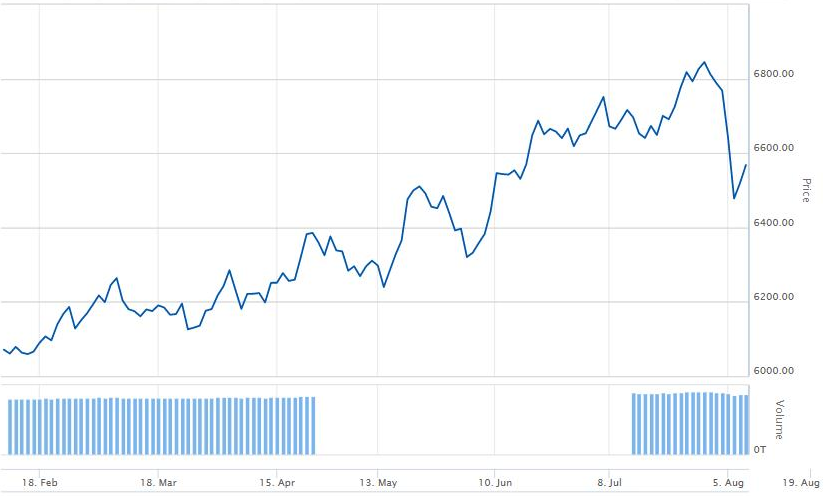The historic and consecutive interest rates cut by the Reserve Bank of Australia in June and July 2019 by 25 basis points to as low as 1 per cent raised eyebrows all over the business world. The economic slowdown in the country might have nearly clinched, but there have been signals that the interest rates would remain at historic lows for an extended period.
RBA governor, Philip Lowe took queries of from the House of Representatives economics committee, stating that the overall growth of the Australian economy would be 2.5 per cent in 2019. The year 2020 was likely to have a slight boost on interest rates to 2.75 per cent, as previously forecasted by the top central bank. According to Mr Lowe, the subdued income growth and weak consumption have contributed the most in keeping the economic growth at bay.
What is supporting RBAâs outlook of Australiaâs growth?
The RBAâs outlook of a decline in the overall economic growth with a mere upliftment next year is heavily supported by factors like the lower interest rates, weakening of the local currency, tax cuts, slow stabilisation of the property sector, the infrastructure spending and improvement in the resources sector. After a disappointing year so far on these fronts, the country has showed signs of a turnaround of events, even though it would be gradual. Addressing the coming times to be a âturning pointâ in Australiaâs economy, the quarterly GDP growth outcomes are expected to strengthen slowly, as per Mr Lowe. Whatâs worrisome is the fact that unemployment has risen amid the subdued growth in wages, which would prolong the growth of the country.
Moreover, the Governor expressed his concerns on the decline in the productivity growth and its impact on the living standards of Australians, hurting the incomes and adversely affecting the government budgets. In the probability of a weakening economy, fiscal stimulus was the need of the hour.
The Governor enlightened on the Interest rates cut chronicle
Mr Lowe firmly believes that the consecutive rate cuts would eventually ease the pressure on the exchange rate and enhance the cash flow situation of Australian households. In the absence of lower interest rates, the Australian dollar would be valued higher, hurting the work sentiments of the export-oriented Australian land. However, as the idiom suggests that every coin has two sides, and so does the concept of rate cuts. Monetary policies are less effective at low interest rates and borrowing isnât well stimulated, as banks are prone to get conservative and the borrowers, more cautious in such situations. Moreover, the commercial banks face dire difficulties, when they pass through the prescribed rate cuts, contracting their net interest margins.
Amid these difficulties, the trigger of the query session was Mr Lowe signalling that the Australian economy could hit zilch in terms of interest rates. With the hope to avoid the situation, the RBA is apparently prepared to announce the interest rates cut to be as low as zero, even though it was way too early to ponder over situations that might cause this historic consequence. Moreover, one cannot avoid the fact that with the global interest rates on a downturn, the Australian interest rates would have to meet the same fate.
The Xi-Trump Conflict Creating Global Havoc
The ongoing China-US trade war has escalated dramatically over the past few weeks. US had vouched to raise tariffs on China, to which China counter-attacked by devaluing the Yuan and banning the US imports. The impact of the conflict has serious repercussions on the worldâs share markets, leading to a 10-year Australian Government Bonds trading on a yield under 1%, keeping the interest rates downgraded as well. The uncertainties prevailing around the war situation is a huge concern for Australia and is presently affecting the investments too. If the war is not curtailed in time, the global economy would move south, as per the Governor.
Which areas require immediate focus?
Given that the Australian economy may have reached a gentle turning point, it was the right time for the Morrison government to promote infrastructure investment and imply tax reforms. Innovation and entrepreneurship should be heavily encouraged, given that Australia is well established contemporary contender across the globe in terms of both technology and skills. Moreover, a better delivery of government services would boost the country and overall productivity levels.
These are the times wherein the balancing attitude of the Australian government in managing budgets and constructive spending would be put to test. In this context, one cannot un-see the impact of the Royal Commission in the Australian economy. With the new policies and reforms being infused among the major banks of the country, the Commissionâs role to get the economy back on the growth trajectory would be an interesting watch for domestic and global market enthusiasts.
Inflation on track?
With banks being stern about the household debts and credit conditions, the low interest rates might increase borrowing risks. Mr Lowe believes that time would unveil the positivity of the consecutive rate cuts, after he was questioned about the inflation being on track. Presently, the RBA expects that it would take over a year for for inflation to hit approximately 2 per cent.
Is New Zealand following the Australian route?
Amid the discussions pertaining to the weakening and structuring of the Australian economy, the New Zealand belt cannot be ignored. Official sources confirm that New Zealand underwent a 50-basis point interest-rate cut this week, implying that it has joined the bandwagon of the economies hitting rock-bottom and being vulnerable to the global sentiments. The main trigger for the rate slash being cited is the US-China war. Coincidently, along the NZ rate cut, the Australian dollar plunged to its lowest level since the Global Financial Crisis of 2009.
How is the ASX performing?
Surrounded by economic sentiments, the share market stance is always an interesting area to watch out for, as it depicts investing behaviour and positioning of the economy. On 9 August 2019, the S&P/ASX 200 , by the end of the market session on ASX was quoted 6,584.8 basis points, up by 0.3 per cent or 16.7 basis points.
Market experts are eagerly waiting to witness the turn of events, of the Australian economy in the coming times, hoping for a rebound that would be here to stay.
Below is the image depicting the six months performance of S&P/ASX 200, which trades under the code XJO on ASX.
 6 months performance of XJO (Source: ASX)
6 months performance of XJO (Source: ASX)
Disclaimer
This website is a service of Kalkine Media Pty. Ltd. A.C.N. 629 651 672. The website has been prepared for informational purposes only and is not intended to be used as a complete source of information on any particular company. Kalkine Media does not in any way endorse or recommend individuals, products or services that may be discussed on this site. Our publications are NOT a solicitation or recommendation to buy, sell or hold. We are neither licensed nor qualified to provide investment advice.






